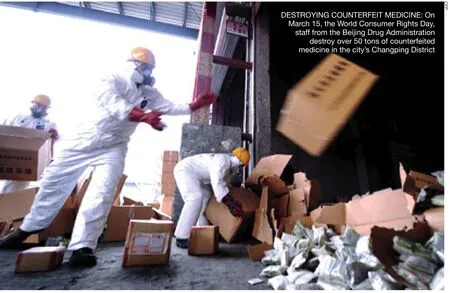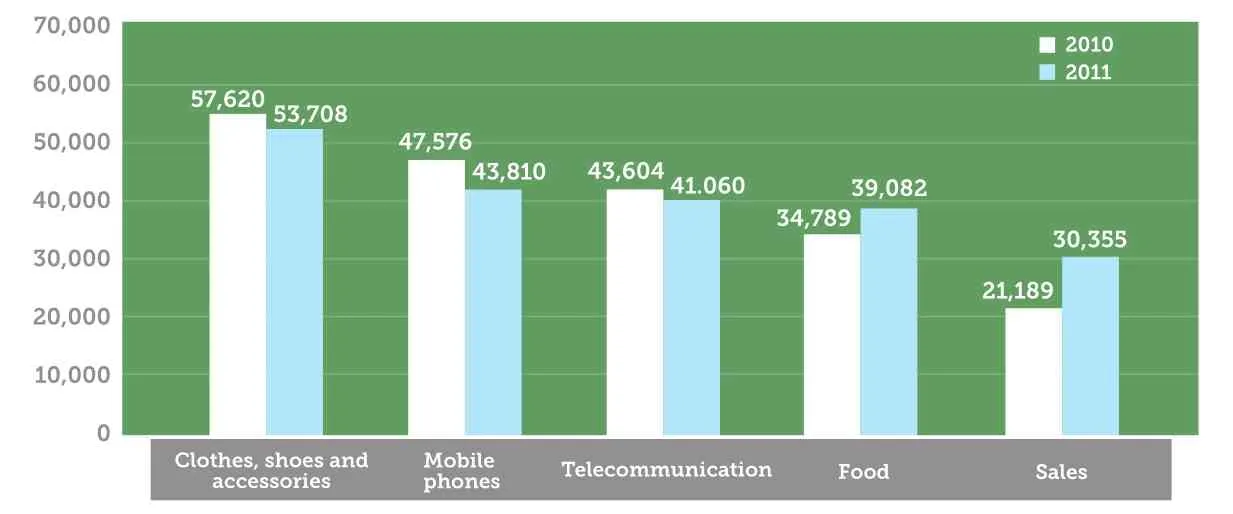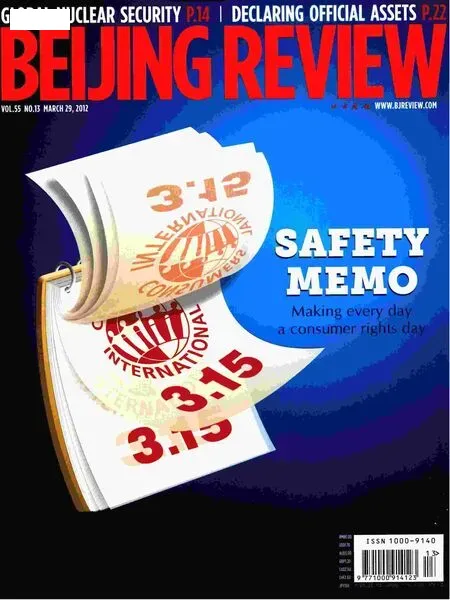PROTECTING CONSUMERS
By Zhou Xiaoyan
PROTECTING CONSUMERS
By Zhou Xiaoyan
The w ar betw een consumers and companies rages on
A once bustling M cDonald’s franchise restaurant in Beijing suspended its business on March 16, one day after a China Central Television (CCTV)program revealed that it had violated its own food-processing guidelines by selling expired food. This particular restaurant was in Beijing’s Sanlitun area, a popular restaurant and entertainment spot in the city’s Chaoyang District.
“After watching the CCTV program, I felt disappointed about McDonald’s. I think it has lost its integrity by not being able to meet the high standard it set,” said Zhou Dingfang,a columnist forL’officiel Hommes, who often went there for dinner. “The high standard for food safety is the reason why we turned to M cDonald’s rather than random vendors on the street. I think I may have to find an alternative now,” she said.
The CCTV program reported that the restaurant so ld fried chicken w ings 90 m inutes after they were cooked although the company’s rules set a 30-m inute lim it.Expired cheese was used on cheeseburgers and workers were caught tampering w ith desserts’ expiry dates or re-packaging them for sale. Worse still, meat patties that were dropped on the fl oor were being reused instead of disposed.
The program, called the 315 Evening Gala, has aired annually on March 15 since 1991. Every year, dozens of reporters are sent out to investigate accusations of corporate irresponsibility or counterfeiting around China.The gala has become an annual event for exposing m isdoings of companies.
Other exposed companies on this year’s gala included: Chinese Student Loves the Eye Protect Comm ittee, a Hong Kongregistered company pretending to be an NGO and doing business in the name of charity; a branch of the supermarket chain Carrefour in Zhengzhou, capital of Henan Province, which deceived consumers by selling expired meat and ordinary chicken as free-range chicken at inflated prices; several affiliated companies of China Telecom, which made profits by offering special services for individuals or companies that send spam messages to cellphone users; and Industrial and Commercial Bank of China (ICBC) and China Merchants Bank (CMB), whose employees illegally sold individual information on their clients to alleged criminals or marketing companies.
Falling on the World Consumer Rights Day, the 315 Evening Gala aims to reveal business m isconduct and protect consumers’rights. This year’s program put the spotlight on building credibility, calling on companies to adhere to their m ission statements and promises to customers.

MCDONALD’S CRISIS: The McDonald’s restaurant in Beijing’s Sanlitun is closed after the CCTV’s 315 Evening Gala uncovered it used expired food and didn’t fo llow its own food-p rocessing guidelines
But relying on companies’ morality can never be the single solution to companies’m isconduct. While consumers need to take action and remain vigilant, the government should shoulder major responsibilities to improve the consumer environment.
In tensify ing sup e rv ision
In recent years, government watchdogs have become the main force for inspecting corporate m isdeeds and substandard products.
Food safety is a major concern for Chinese people as several scandals have been revealed in recent years, starting w ith the melamine scandal that abashed China’s dairy industry in 2008.
In 2011, major victories were won in the war on the production and sale of gutter oil and pork products laced w ith illegal additives.M ore than 270 cases involving these two crimes were investigated and 320 people were convicted. Also 202 government employees were given prison sentences for their involvement.
“W e can’t get lax on ensuring food safety,” said Yu Jun, Deputy Director of the Food Safety Commission Office of the State Council.
“In 2012, we w ill launch more campaigns against illegal food additives, illegally recycled waste cooking oil and the feeding of pigs w ith illegal chem icals,” said Yu.
Inspecting and regulating everyday consumer items were also on the government’s radar.
In 2011, the General Adm inistration o f Quality Supervision, Inspection and Quarantine (AQSIQ) exam ined 19,328 clothing com panies and 20,965 kinds of their products. The result shows 87.5 percent were qualified. In the first quarter of 2012, it conducted checks on 300 kinds of casual clothes, only 34 of which were found to be substandard, according to AQSIQ spokesman Li Yunpin.
Unfair contracts, often “take it, or leave it” in w riting, are another heated area attracting w idespread complaints from consumers each year. In 2012, the State Administration for Industry and Commerce (SAIC) w ill launch a nationw ide campaign against these contracts in water supply, electricity supply,telecommunication services, financial services, traveling and restaurants.
“We w ill propel the implementation of standard and unified contracts in those sectors,” said Yang Hongfeng, Deputy Director of the Market Division of SAIC.

Despite the government’s efforts, supervision is far from enough.
In those exposed cases, government departments share the responsibilities as well, said Dong Yuyu, a commentator at the Beijing-basedGuangming Daily.
For example, multinationals are famous for their high-quality product and standards.Chinese often have higher expectations for them than for our local brands, but sometimes they turn “evil” as soon as they land in China,said Dong.
“That’s because we lack efficient supervision. W ithout a sound supervision system, we can’t expect them to follow strict rules as they do in other countries,” said Dong. If supervising departments can’t perform their duty well,there w ill be more and more multinationals that won’t carry out their promises in China.
Raising com p ensa tion
Chinese consumers have become more aware of their rights w hen shopping or buying services, as indicated in the number of complaints they fi le each year.
China Consumers’ Association (CCA),a nationw ide organization for receiving consumer complaints and protecting consumer rights established in 1984, received 607,263 complaints from consumers in 2011, which ranged from quality, prices and contracts to safety, and targeted the auto industry, food safety, express delivery and financial services. Among the total,571,918 were addressed.
But the compensation is very low. According to the CCA, almost 804.18 m illion yuan ($127.3 m illion) in losses was recovered last year.
The average compensation of each case for Chinese consumers was about 1,000 yuan ($160) while the figure in the United States is close to $350,000,according to the CCA.
The problem is the high cost for consumers to fight for their legitimate rights, both in terms of time and money.
W hen their consumer rights are infringed, only 20 percent of Chinese consumers manage to get corresponding com pensation in the end, according to a survey conducted byChina Youth Dailyin March 2011. More than 25 percent of the respondents have given up fighting for their consumer rights because of high costs and low compensation.
“Generally speaking, the time cost and economic cost are both too high for Chinese consumers to demand compensation,” said Qiu Baochang, head of the legal team of the CCA.
“This situation must be changed. The cost should be lowered to make it more convenient for consumers to protect their legitimate rights,” he said.
“W e shou ld learn from developed countries, which give more incentives to consumers to protect their rights on their own,”said Li Jun, a law professor at the University of International Business and Economics. For instance, a U.S. woman got $460,000 in compensation from McDonald’s because her lips were burned by coffee that was too hot.
The government should enhance the level of compensation and give consumers more leverage when bringing lawsuits against companies, such as simplifying procedures and allowing consumers to file litigation on weekends when they have more free time, he said.
“If high-level compensation like in the United States can be realized in China, no companies would dare to take the risk of ignoring Chinese consumers,” said Li.
Improving legal system
The current legal system, which is still playing catch-up with a consumer society, is another obstacle standing in the way of Chinese consumers and their legal rights.
China’s legal system doesn’t have severe enough punishments for irresponsible companies, said Li Er, a commentator at Shenzhen Economic Daily.
“But the most important reason for companies’ ignorance of Chinese consumer rights is that we don’t support a class-action lawsuit system,” Li said.
Countless cases tell us that when confronted with large companies Chinese consumers are often left to their own defense.The CCA is more of an intermediator than a real representative for consumer profits.
“The most urgent task is supporting classaction lawsuits and making CCA the real representative for consumers in class-action suits,” said Li.
With the absence of the class-action lawsuit system, Chinese consumers can only see an apology letter, pledging to right its wrongs and immediately investigate the isolated incident, on McDonald’s China’s official website after the food scandal, instead of getting hundreds of thousands of dollars in compensation like the woman in the United States.

Top Five Categories With Most Consumer Complaints

